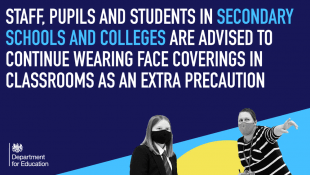Why do secondary school and college students have to carry on wearing face coverings? Your questions answered

@EducaionGovUK have confirmed that face coverings should continue to be worn by adults and those in Year 7 and above as a precautionary measure when students return to schools and colleges after the Easter break.
Face coverings have been required in secondary schools and colleges and for adults in primary schools since the return to education on 8 March. We said we would review the policy over Easter but have decided to keep it in place for now in line with the best advice.
Your questions answered:
Why has the decision been made for students to continue wearing face masks after Easter?
We’ve always said we would review the measures on face coverings in classrooms at Easter based on the latest scientific and medical advice.
In line with public health advice and based on evidence from the last few weeks, face coverings should continue to be worn by adults and those in Year 7 and above as a precautionary measure.
The guidance on face coverings will be reassessed at Stage 3 of the government’s roadmap, which will be no earlier than Thursday 17 May.
What does the medical and scientific advice say to support the decision?
It’s crucial that we don’t rush this, and this decision has been taken with consideration to the relaxing of other measures across society over the coming weeks.
The review has taken into account the latest scientific evidence and data from Public Health England and feedback from teachers and leaders on their experiences of face coverings being worn in classrooms.
Alongside rapid testing, the available scientific evidence suggests that, when used correctly, wearing a face covering reduces the emission of virus-carrying particles when worn by an infected user, helping to protect others.
Keeping the current measures in place will let us continue to monitor the effect of Coronavirus in schools and colleges as pupils return.
Those who are currently exempt from wearing face coverings will remain so, including pupils or staff who are speaking to or providing assistance to someone who relies on lip reading, clear sound or facial expression to communicate.
But I heard that face coverings hinder students learning?
We understand that teaching and learning can be more challenging when wearing face coverings. This must, however, be balanced against the public health considerations and keeping pupils as safe as possible in school as the vaccine roll-out continues.
In certain circumstances, for example, for people who cannot put on, wear or remove a face covering because of a physical or mental illness or impairment, or disability it would not be appropriate so in those instances students do not have to wear face coverings. The same applies to situations where wearing a face covering would have an impact on the ability to take part in exercise or strenuous activity, for example in PE lessons.
What about students who are 18 years or older in the classroom?
The position remains unchanged. In schools and colleges where pupils and students in year 7 and above are educated, including those over the age of 18, face coverings should be worn. This includes in the classrooms and during activities, unless social distancing can be maintained, or they are exempt.
So will you be getting rid of this rule on 17 May?
We cannot pre-empt what decisions will be made at Stage 3 but face coverings in schools and colleges will be under review at that point.
We do not want pupils to have to wear face coverings any longer than is necessary – but while it is necessary the current measures will remain in place.











Responses